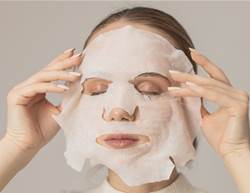From golden milk lattes to ginger immunity shots to skincare, you can find turmeric’s golden hue in most aisles of a health food store. The potential health benefits of turmeric include boosting your memory and easing osteoarthritis pain. But what about benefits for your skin? Spoiler alert: there are equal parts skepticism and promise around the topic.
Below, we break down all of the potential perks of turmeric, according to experts and studies. But as seeing results isn’t as simple as rubbing a spoonful of cooking spice on your skin, keep reading for what you need to know.
Turmeric benefits for skin
Turmeric, and more specifically, its bioactive compound, curcumin, has “at least some evidence of anti-inflammatory, antimicrobial, and antioxidant properties,” explains dermatologist Dr Daniel Friedmann. However, he adds, many of the purported claims are based on single studies with few participants. With that in mind, here are its biggest claims to fame.
It may combat inflammation
In traditional Asian medicine, curcumin has been used to manage the skin inflammation associated with eczema and atopic dermatitis. One clinical study observed that in practice using an herbal extract cream that contained curcumin, finding that it alleviated scaling, thickening, and itching.
However, Dr Friedmann points out that because the cream contained multiple different ingredients, there is no way to know for sure that turmeric was responsible for improvements.
It may kill acne- and infection-causing bacteria
So far, research has not proven the sole acne-healing powers of curcumin. However, one study did find that curcumin treated with blue light killed a specific acne-causing bacteria. Another group of studies found that liposomal gel containing both curcumin and lauric acid also fought off acne-causing bacteria and significantly reduced comedones and inflammation in rats.
In a separate study, blue light and curcumin were found to be an effective treatment of skin infections like MRSA in mice.
It has been found to aid in psoriasis healing
Curcumin is believed to treat psoriasis by interfering the overproduction of skin cells that create scaly psoriasis plaques. In an older study, 647 people with psoriasis applied a curcumin gel to psoriasis lesions, and after 16 weeks, experienced a significant reduction in symptoms. Symptoms disappeared completely in 72.2% of participants.
It may fade hyperpigmentation and scarring
“Turmeric is believed to reduce the production of melanin in the skin, lightening areas that are hyperpigmented from UV damage or post-acne hyperpigmentation,” says dermatologist Dr Deanne Mraz. One study reported six case studies in which a hydro-alcoholic gel of 12% curcumin reduced scarring on patients who had skin cancer surgically removed.
Its antioxidant properties protect the skin
Turmeric is “rich in antioxidant properties that protect the skin from oxidative damage,” explains Dr Mraz. More specifically, curcumin taken orally has been found to counteract cell damage from the environment and disease. That means it could be your new favourite antioxidant serum ingredient, but more research is needed to determine its topical efficacy.
It could promote wound healing
In one study, daily topical application of curcumin accelerated wound healing in irradiated mini pigs. It’s believed to do so by enhancing collagen synthesis, Dr Mraz notes. Researchers believe that topical application of curcumin seems to have more pronounced effects on wound healing compared to oral administration because it’s more bioavailable on the skin’s surface.
It may prevent fine lines and wrinkles
“Studies show curcumin blocks the enzyme elastase, which inhibits the skin’s natural ability to produce elastin, a key protein in our skin that is responsible for its tone,” explains Dr Mraz.
One small clinical study on 28 women in their 30s investigated the use of an herbal gel containing turmeric, rosemary, and gotu kola and found that it led to a significant improvement in skin firmness and subjects’ overall self-evaluations after four weeks of daily use.
It may brighten dark under-eyes
Dr Mraz says curcumin supports healthy blood circulation, “which may improve the appearance of dark circles and puffiness under the eyes.” However, research on its circulatory benefits is preliminary and tested on oral supplement versions of the herb.
It may boost hair growth
One study has shown that an extract of turmeric can help the hair loss drug Minoxidil penetrate deeper when applied topically, Dr Friedmann notes, potentially further improving hair growth.
It may potentially be anti-cancerous
The research is in very early stages, but some performed on cell cultures found curcumin to block the proliferation, migration, and invasion of melanoma cells that lead to skin cancer.
Turmeric skincare risks
Aside from the previously mentioned need for more research on turmeric’s skincare applications, there are practical risks that come with using it in spice form. As you probably know, it’s bright orange in colour and can stain surfaces (and potentially, skin) easily, Dr Mraz notes.
Plus, “like any other topical ingredient, there is a risk that turmeric, especially if used in a DIY mask, can cause irritation,” she adds. “If you have sensitive skin, be sure to do a test patch on your inner arm and see how your skin reacts.”
How can I use turmeric for glowing skin?
Most studies that display promising findings for turmeric in skincare use curcurmin, the active compound, extracted from turmeric, Dr Friedmann explains. This means that there’s no guarantee that applying the spice, even in its most organic form, will glean any glow. “I have absolutely no idea if DIY application of turmeric treatment will produce any clinical benefits,” he says.
With that being said, if you’re curious about incorporating curcumin into your skincare, both he and Dr Mraz recommend looking for a topical serum that has been formulated with curcumin extracted from turmeric.
Just be sure to take note of any other actives (eg exfoliants like glycolic or lactic acid) that may be in the formula you choose, because the more there are, the more likely the product is to cause irritation. To stay on the safe side, Dr Mraz recommends choosing a serum that contains curcumin alongside gentle ingredients like antioxidants (like niacinamide or vitamin C) and hydrators (like hyaluronic acid).







.jpg&h=193&w=250&c=1&s=1)


